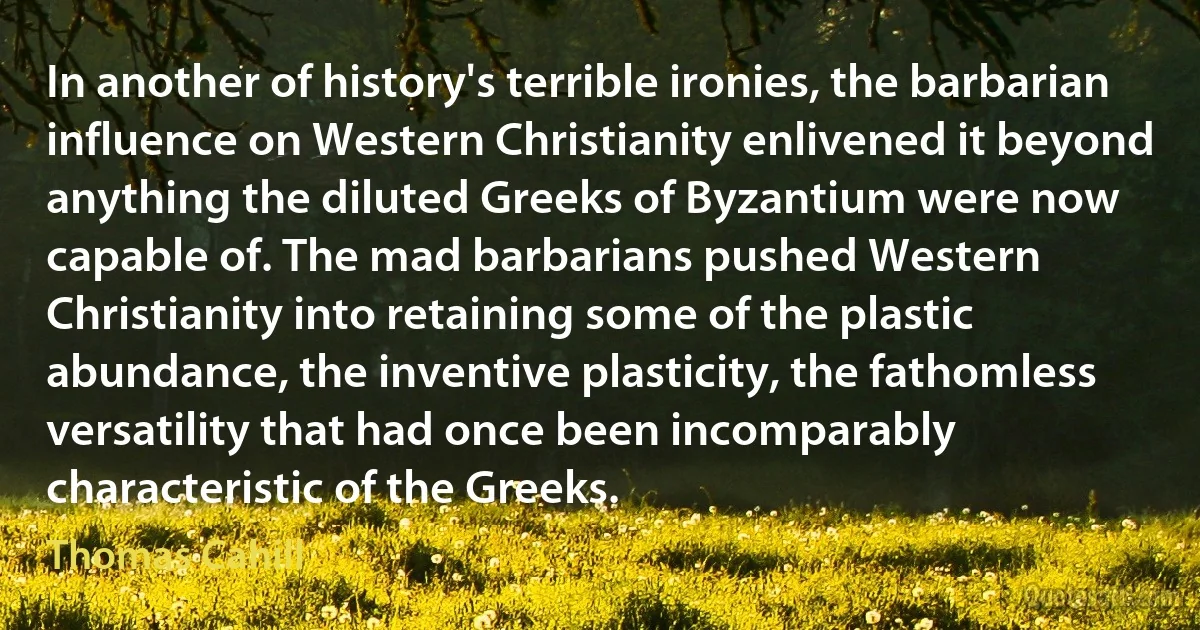Byzantium Quotes
Each form of the sacrosanct was regarded by members of the culture which gave rise to it as a revelation of the Truth; at Byzantium it was not a mere hypothesis that was sponsored by the majesty of the Byzantine style. To us, however, these forms make their appeal as forms alone - in other words, as they would be were they the work of a contemporary (and, since this actually is unthinkable, they affect us in a puzzling manner); or else as so many grandiose vestiges of a faith that has died out. We look at them from outside; they are still emotive, but they are no longer true. Thus we deprive them of what was their most vital element; for a religious civilization that regarded what it revered as a mere hypothesis is inconceivable.

André Malraux
China under the Tang, Sung, and Ming dynasties, the Islamic world from the eighth to the twelfth centuries, and Byzantium from the eighth to the eleventh centuries far surpassed Europe in wealth, territory, military power, and artistic, literary and scientific achievements. Between the eleventh and thirteen centuries, European culture began to develop, facilitated by the "eager and systematic appropriation of suitable elements from the higher civilization of Islam and Bizantium, together with adaptation of this inheritance to the special conditions and interests of the West."

Samuel P. Huntington
It would never have been possible for Byzantine court art to become the Christian art par excellence, if the Church itself had not become an absolute authority and had not felt itself to be mistress of the world. In other words, the Byzantine style was only able to gain a footing everywhere where there was a Christian art, because the Catholic Church in the West desired to become the power the Emperor was already in Byzantium.

Arnold Hauser
Once out of nature I shall never take My bodily form from any natural thing, But such a form as Grecian goldsmiths make Of hammered gold and gold enameling To keep a drowsy Emperor awake Or set upon a golden bough to sing To lords and ladies of Byzantium Of what is past, or passing, or to come.

William Butler Yeats
Now I am going to wash myself. Please do not embrace me as I have not washed yet. And you? Even were I to anoint myself with fragrant oils from Byzantium, you would not embrace me-not unless forced to by magnetism. But there are forces in Nature! Today you will dream that you are embracing me! You have to pay for the nightmare you caused me last night!

Frédéric Chopin
A Christianity split into a diversity of ecclesiastical streams, the dualism implicit within its political agenda – nation-forming on the one side, universalism on the other was further accentuated. The classical eastern orthodox form stressing the power of the emperor was in principle universalist enough in its vision of Constantinople as the New Rome, but in practice Byzantium became a rather thoroughly Greek empire, alienating non-Greeks in Egypt, Syria or the west. This combined with its considerable degree of Caesaropapism led to the generation of a type of church-state relationship characteristic of eastern autocephalous churches of a highly nationalist type.

Adrian Hastings
But perhaps the most significant factor in the turn to a Greek ethnicism, which resisted both the Turkish turban and the Latin mitre in the years before the fall of Constantinople, was the opposition of the urban populace, led by the Orthodox party, monks, and priests, to the wealthy urban classes and the Byzantine court. After the Ottoman conquest in 1453, recognition by the Turks of the Greek millet under its Patriarch and Church helped to ensure the persistence of a separate ethnic identity, which, even if it did not produce a ‘precocious nationalism' among the Greeks, provided the later Greek enlighteners and nationalists with a cultural constituency fed by political dreams and apocalyptic prophecies of the recapture of Constantinople and the restoration of Greek Byzantium and its Orthodox emperor in all his glory.

Anthony D. Smith


